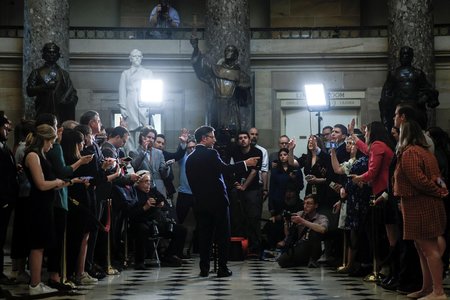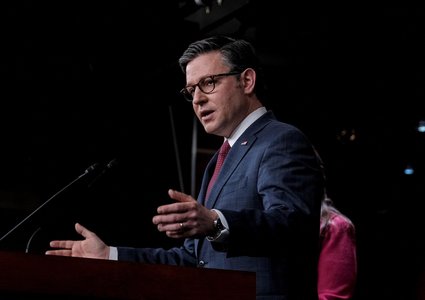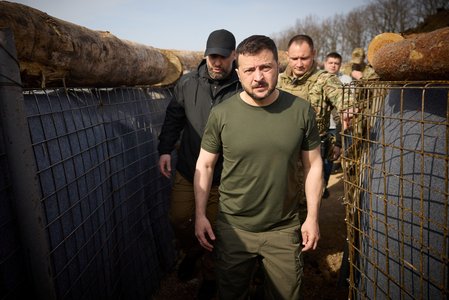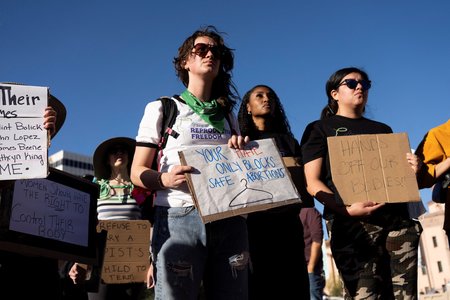As President Trump prepares to deliver a joint address to Congress, Hispanic political leaders are meeting in Washington to figure out how to combat his agenda on immigration and deportations. Democrats are picking a new leader for their party who will have to focus on winning back control of Congress and state houses across the country.
Special: Latino activists fight Trump's agenda and Democrats search for new leader and path forward
Feb. 24, 2017 AT 9:29 p.m. EST
TRANSCRIPT
Notice: Transcripts are machine and human generated and lightly edited for accuracy. They may contain errors.
ROBERT COSTA: Hello. I’m Robert Costa, and this is Washington Week ’s Extra , where we pick up online where we left off on the broadcast.
Julie, one of the things we talked about a lot tonight was this energy on the left. What can we expect from Latino groups moving forward on issues like immigration?
JULIE HIRSCHFELD DAVIS: Well, I think they’ve been really energized by all that Donald Trump has done already since he was inaugurated to crack down on immigration, to sort of beef up enforcement. And you know, as Dan said earlier, people are really feeling the fear and feeling the uncertainty in their communities, and I think what we’re seeing is an effort to really capitalize on that in elections. So on the day that Donald Trump is going to make his big speech to the joint session of Congress, there is a Latino PAC, Latino Victory Fund, that’s going to come to D.C. and have a big summit where they’re going to – they’ve invited all the big leaders in their community, members of Congress from Hispanic communities, the first Latina senator – Catherine Cortez Masto – to talk about ways that they can harness some of this energy and actually put it back into races, not just for Congress but also at the state, also at the local levels, in communities that are actually going to be affected by these things like sanctuary cities and places that don’t actually want to play ball with some of these efforts to really go after and round up undocumented immigrants. So we’re going to see some of that starting next week, and I think the real question is whether they’re going to be able to actually sustain any of this given that, you know, we do have an all-Republican Congress, a very energized Republican president. Are they going to be able to, you know, put this into some action in races, or is this kind of just going to peter out?
MR. COSTA: Well, part of the question there will be who’s actually leading the party. Dan, we have this ongoing race for Democratic National Committee chairman. You have Tom Perez, the former labor secretary in the Obama administration; Pete Buttigieg, the mayor of South Bend, Indiana; and Keith Ellison, a congressman from Minnesota. It seems to me like Buttigieg is this compromise candidate from the Midwest, but Ellison has a lot of support on the left among Senator Sanders supporters, Perez has a lot of support among President Obama’s allies. How is it going to play out? And regardless of who wins, what does it tell us about the Democratic Party, this race?
DAN BALZ: Well, I mean, the way this race has played out is in some ways both a reflection of where the Democratic Party has been, but also a kind of a misnomer as to what the role of the DNC chair really is. I mean, that’s the curious part of this. This has become a kind of a proxy war between the Clinton – the part of the party that was partial to Clinton and the part of the party that was partial to Bernie Sanders. Ellison is the proxy for the Sanders forces, Perez for the – for the Clinton forces, and he has support from people in the Obama administration. And yet – and so – and that does define a division within the party that is going to outlast this vote. I mean, when you go through the kind of primary that the Democrats went through, those divisions are lasting. They take a while to get over. And so those forces are going to be there.
But the role of the DNC chair is not to be, in essence, the public spokesperson or even the person who defines exactly where the party is ideologically. The role of the DNC chair is a nuts-and-bolts role, to prepare the machinery to help get Democrats elected up and down the ballot. And the race seems to have ignored that part of it and talked more about the energy on the left and those kinds of issues.
MR. COSTA: So, if that’s the case, Molly, who’s the soul of the Democratic Party right now? If it’s not the DNC race, perhaps is this is microcosm of what’s really happening, is it someone in Congress? Is it someone in the states?
MOLLY BALL: It’s not clear who’s going to lead the Democratic Party going forward. But of course, at this point in 2013, we didn’t think that Donald Trump would be the nominee of the Republican Party either. Presidential primaries decide that. I think the heart and soul of the Democratic Party right now is the Democratic grassroots that it out in the streets and that is organizing and sort of taking it upon itself. And that can be a force that may imperil Democrats, as the Tea Party imperiled Republicans in the early Obama years, but it also can provide them with the energy they need, because they have been so dispirited. I mean, I think Dan’s exactly right about the sort of proxy – it’s become – the race became for the Democratic primary.
But it’s also a proxy for the political argument that Democrats are having about how they can move forward and start winning elections again. Is it about trying to get those, you know, white working-class voters that Trump really galvanized and flipped, or got out to vote for the first time in states like Michigan and Wisconsin and Pennsylvania, that everyone thought were safe blue-wall states for the Democrats? Or is it about getting higher turnout out of the minority communities in cities, in places like Milwaukee and Detroit, where they saw depressed turnout, particularly among younger African-American and Hispanic voters? Is that the way forward? And so I think the DNC race is also about that political fight the Democrats are nowhere close to resolving.
MR. COSTA: Real quick, from Julie, the Trump White House seems to not be even running against or combatting the Democratic Party. It’s running against the media, who they say is the opposition party. Do they see any threats right now in the actual Democratic Party?
MS. DAVIS: I don’t think so. I mean, I think until we know the direction of – that the Democratic Party is going to take, I do think that Donald Trump prefers to kind of run against and sort of be opposed to, in a forward-facing manner, the press. And he’s actually said, you know, the press is much more effective as an opposition than Democrats are. I mean, he does actually know that he’s going to have to work with some Democrats to get some of this stuff done. So there is going to have to be some sort of bridge-building that goes on there. But right now, I don’t think we see him taking on any one faction or any one person in the Democratic Party in that way.
And I think part of it is, as Molly said, we don’t know who that person or that force really is. He is kind of going to war against the grassroots movement, though. I mean, we hear him sort of characterize them as paid protestors and, you know, undermining sort of their point of view. And so, you know, it’ll be interesting to see whether that continues as well, because that’s also a pretty unconventional way to talk about political movements in this country, even those that oppose you.
MR. COSTA: And Steve Bannon, he said at CPAC: No moderation and a fight every day. So, Democrats, dig in.
That’s it for the Washington Week Extra . While you’re online, test your news knowledge on the Washington Week-ly Quiz. Plus, join us as Washington Week celebrates its golden anniversary with a look back at the 10 biggest stories Washington Week covered in its first 50 years.
I’m Robert Costa. Thanks for watching.
MOST POPULAR


Full Episode: Washington Week with The Atlantic full episode, 4/19/24


Clip: Will Democrats rescue Johnson's speakership to protect aid for Ukraine and Israel?


Clip: Attacks in Israel and Iran bring more uncertainty to Middle East

Preview: Coming Up on Washington Week with The Atlantic


Full Episode: Washington Week with The Atlantic full episode, 4/12/24

© 1996 - 2024 WETA. All Rights Reserved.
PBS is a 501(c)(3) not-for-profit organization

